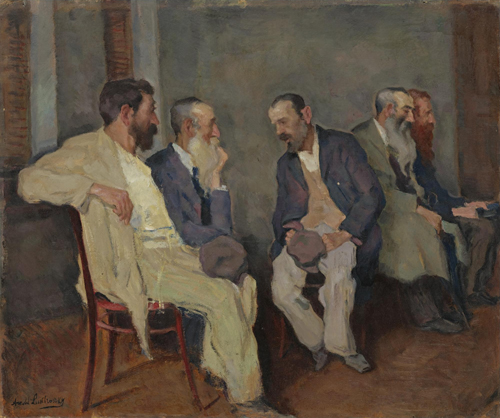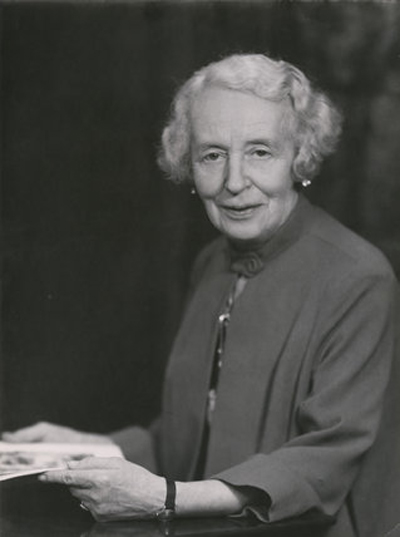by Friedrich Hansen (October 2017)

The Conversation, Arnold Lakhovsky, 1935
The change of vocabulary is a key to history. Therefore, the strangulation of language with speech codes such as PC is not trivial and it merits a closer look. We might be able to uncover sensibilities of the English people related to custom, constitutional and casuistic law based on precedent. The “Writing on the Wall” of Europe’s demise was first noticed by European parliament member, Nigel Farage of UKIP, and it continues to inspire anti-globalist sentiments worldwide. For instance, his presence was felt in the victory of Roy Moore in the recent Senate race in Alabama. Farage’s rhetoric is nailing down the difference between the way elites talk as opposed to the way they think and act, i.e., issues of authentic being. Put differently this is about reclaiming political particularism, everyone’s “love of the little platoon, we belong to in society”, of which Edmund Burke spoke (Paras 75-99, Reflections on the French Revolution, 1790), this “first principle of public affection” which the global elites keep mocking as populism, combining traditional values like family, nation and transcendent values.
The liberal elite is infatuated with the fictional world of pop (primacy of possibilities) based on fantasy which is thriving on the Web, mainstream media, and the realms of music, film, and gender studies. As a result, all of us are consuming far more images these days than we are words and ideas. And yet images are static, highly stereotyped, perfectionistic and the default medium of emotion while words are dynamic, flexible, and hierarchic and the medium of the intellect. This alone explains the drying up of creative work in the arts and sciences and instead the sexing up of everything. For images by themselves pander to pride, facile status, complacency, or to envy, sameness and mirror thinking, whereas words alone are capable of reaching into transcendence and can elicit change. From there we can understand why more traditional British sensibilities came to the fore from under the high gloss finish of elite talk emanating from Europe’s smug chattering classes.
The voice of the middle class and more specifically of the country-side reflecting authentic English pragmatic thinking has almost vanished. Yet still the British seem to be far less ideological and irrational about climate change than the post-Nazi Germans as is suggested by their different attitude toward nuclear energy. On a number of issues, the clash of cultures stirred up by Brexit is reflecting the choice of “process” over Angst-driven fait acompli, or British fondness for lively debate versus German quietism and conformism. An abyss of cultural diversity has opened recently with many people harking back to Victorian values, with echoes back to formative 17the century civil war. That vibrant period saw the rise of British Israelis, which later culminated in an English New Jerusalem celebrated by Hubert Parry, William Blake and Edward Elgar. It all began in Amsterdam with Menasse ben Israel, who married Rahel Abrabanel, a scion of one of the oldest and most distinguished Jewish-Iberian families. Menasse’s book Hope of Israel of 1650 argued for the readmission of the Jews to England as a way of hastening the coming of the Messiah—a response to Oliver Cromwell’s call for a Jewish return to England. Cromwell foresaw the important role of Jewish “merchant princes” for English commerce. In Amsterdam, Menasse founded the largest Hebrew printing press in Europe, was the teacher of Baruch de Spinoza and close friend of Rembrandt van Rijn.

Farage divining EU disaster: The Writing on the Wall (Rembrandt, Belshazzar’s Feast, 1636)
Yet, it is the development of the tradition of English common law that more than anything embodies British identity—embodied in several curious London “Inns” of old-fashioned lawyer associations. This explains why British lawyers in contrast to the run-of-the-mill urban elites are siding with Brexit.
Now, the man most famous for bringing this about is the 17th century constitutional jurist John Selden, son of a farmer and yet the most accomplished Hebraist of his time: “Selden deployed his immense scholarship to rebuff universalistic theories by turning their usual argument on its head— he argued that rational and abstract laws are utterly useless at compelling and ruling actual peoples, who have particular propensities and qualities,” says Ofir Haivri from the Herzl-Institute in Jerusalem, who recently published the most perceptive Brexit-related book, titled John Selden and the Western political Tradition (2017).
Several generations of English philosemites, many of them fluent in Hebrew, would ensure that an equally rebellious and erudite Judaism could make inroads into classic English liberalism and constitutional law. British Israelites were later known as the tribe strongly associated with George Elliot through her novel Daniel Deronda, the stories of Prime Minister Benjamin Disraeli and also with the famous Balfour Declaration of 1917 that cleared the way for Zionism. All this would have been unthinkable in Germany (please see Gertrude Himmelfarb: Philosemitism in England 2011).

Mentor of particularistic English Common Law, John Selden, 1584-1654 (artist unknown)
Valuable clues of the “elective affinities” between the Hebrew and English tongues are to be gained by the fact that both share a preference of dynamic verbs over static nouns. It appears that the Indo-Germanic roots of the Anglo-Saxon tongue have, to some degree, been glossed over by the Semitic charisma, if the wealth of circumstantial “phrasal verbs” in English is any guide. No doubt, the variety and sheer number of English verbs stands out among all the major languages, suggesting that England is much closer to dynamic Jerusalem than to static Athens. No doubt, verbs are the backbone of both languages. Verbal expressions lend support to the practical trajectory of thought and afforded Judaism the multiple talents emerging from Alexandria in antiquity and during the Arabic Enlightenment from Cordoba—long before Renaissance man made his first appearance.
We might equally blame the wealth of verbal expressions for the sure-footed brand of English empiricism and pragmatism. The contrast to German idealism and scientific monism could not be greater, manifesting itself in a language enthralled by static nouns like virtual castles of hot air. George Santayana exposed this better than anyone in his almost-satirical book on Kant’s concept of the autonomous self in his Egotism in German Philosophy. This German idiosyncratic bent points back to the persisting influence of Greek idealist metaphysics in Germany which is also behind a specific brand of German speculative philosophy. No country seems to have delved itself so deep into Hellenism as Germany, perhaps corroborated by the correspondence between the stretch of horizontal German provinces and the equally flat, chaotic multitude of the Greek polis.
Greek-metaphysical trains of thought reveal themselves through narcissist “mirror thinking” which is believed to have dominated the Occident until the romantic era—yet more so on the Continent than on the British Isles (M.H. Abrams, The Mirror and the Lamp, 1953). As a result German epistemology came under the spell of a sharp metaphysical split between idealism and materialism in the 19th century, which would eventually become a nemesis of sorts, seriously disturbing the minds of many a German artist or thinker: Hölderlin, Kleist, Winkelmann, Nietzsche, and Otto Weininger among others (Eliza Marion Butler, The Tyranny of Greece over Germany, London: 1935/2012). Butler‘s brilliant study—another recently republished Brexit-related book—was controversial in Britain and banned in Germany during the Nazi-Reich when it was originally produced. She argued that Germany had too much exposure to Ancient Greek literature and art. The result was that the German mind succumbed to “the tyranny of an ideal. The German worship of Ancient Greece emboldened the Nazis to remake Europe in their image.” To my knowledge this kind of Hellenistic derangement had no parallel in Britain—a country luckily more exposed to Judaism which as we have seen was to strengthen the English mind rather than weaken it.
Conversely the thinkers of the Protestant Continent, namely Leibniz and Spinoza, would set animated and non-animated beings on a level playing field, thus enabling the transition from Catholic subjective value theory to Protestant objective value, later adopted by Adam Smith.
Yet a transcendental bent in the English mind would still survive in this period. It was manifest in Adam Smith’s first book, which concerned itself with moral sentiments. English pragmatism left enough room and flexibility for rational and irrational trains of thought to coexist, which allows dynamic features of the soul to flourish rather than static ones. This faculty rendered English much less amenable to Greek and subsequently German metaphysics which was to manifest itself in proliferating abstractions and technical jargon. In the British Isles any kind of “ism” remained a hard-sell while empirical, utilitarian, and pragmatic concepts remained deeply ingrained.

Eliza Marian Butler, 1885-1959, Cambridge University
At the same time idealist-materialist dualism and abstract-mechanistic concepts were common in Germany. The organic and mechanistic bent in Germany was a result of medieval craftsmanship. Because of the late German nation state the guild features persisted well into the 19th century and the romantics were still enthralled by them. While the artisan or craftsman is akin to pre-Socratic and rather static Parmenides with his notion of split reality (appearance vs essence), the merchant is closer to the dynamics of Heraclitus’ Panta rhei. Characteristically, the German language is heavy with rules for grammar, reminiscent of medieval guilds with their habit of regulating anything. It is this regulatory and corporatist mentality which sets Germany apart from free-market temperament still running strong in Britain.
Thus, German verbs are far more likely to be transformed into awkward nouns than the other way ‘round. In addition, even with verbs in German the intransitive or passive forms abound while in English the active or transitive verbs are more in use. Even more dramatically, however, during the Weimar period, barely digested cultural tensions manifested themselves in grave linguistic deformations, compound nouns, elicited by shock-frozen images turned into clunky metaphors. These sprang from the instrumentalist thinking of the romantic soul, also drawing inspiration from the mechanistic-medieval linguistics. The results were unwieldy compounds that remain a permanent stain and nuisance of the German tongue, depriving it of any elegance—such as “Reichssicherheitshauptamt,” or “Reichsvollkornbrotausschuss,” and hundreds more, which I am afraid cannot be translated.
The contrast to the soft and fluid English tongue could not be greater. Catching the movement, the flexible jargon of commerce served the English merchant class well. Even an accomplished German novelist such as Thomas Mann struggled with the mechanical medieval remnants.
Mann’s awkward and often laborious sentences call to mind the wood cutter giving us few brilliant insights but more often clumsy forms and tiresome expressions in long sentences. His short stories, though, such as “Death in Venice” are a much better read. Mann is certainly the genius to enlighten us on the specifics of the Germanic soul by exposing the notoriously anxious German “Michel,” the petit bourgeois. Being a proper idealist means that he needs to hold on to some solid compounds. Those nouns are needed to offer a structure meant to stabilize the feeble mind of the speaker in the act of speaking—a tentative, balancing-act to be sure. A speaker precarious in himself might hope to get some measure of certainty through rigid intellectual performances eager to claw sparks of truth from tangibles. The contrast to the freewheeling, yet still elegant, swing of the English tongue with its distinct but loose grammar and relaxed semiotics is remarkable. Relaxed is perhaps an understatement for the mindboggling, playful volatility of English synonyms.
Again, this contrasts greatly with the German inborn longing for recognition, more often than not nudging them towards pride and pomp, copied from the like-minded and irritable Greeks—whereas Englishmen are famous for their understatement, casual tone and flexible, non-assertive expressions. This might be among the reasons for denying the Germans in the run up to WW I the role of a colonial power. The international community had convinced itself that Germany was incapable of looking after colonies abroad. Today, this might be the course of some deja vu regarding German leadership in Europe with Chancellor Angela Merkel, famous for “sitting out” any conflict, improvising ad hoc before resorting to behind-the-scene dealings. Not for nothing have “idling” hands become her iconic trope, just as it was with her mentor Kohl—both again reminiscent of the medieval craftsman who, upon idling, would rarely find a place to put his hands.
The German fondness of reification and compounds are like “ready mades” —Dada was a genuine German creation—with little demands on patience. Looked at more closely, compound nouns suggest perfection, order and finitude while English phrasal verbs are sustaining open-end, process and inklings of infinitude. Thus, a conservative language like English is prone to expressions of the brisk swing between the subjective and objective aspect of an issue reflecting its transcendent bent. More metaphysically inclined German does lack this flexibility, cherishes facts and results or the fait accompli. This ontological gap is among the secrets that seem to be driving the daring and jolly English temperament which again contrasts with German gloom and seriousness. On principal grounds brilliantly explicated by Kierkegaard, surging anxieties were the product of reckless secularization in the 19th century, yet not so much in Britain. Sure, the Nazis almost blotted out Christianity in their lands, a burden still carried by Germany. Why would Britain be keen to share this burden of anxieties, channeled through EU directives seventy years after defeating the Nazis.
Another example is the troubling language to be found in German science text books. To read them as a freshman used to be so painstaking, awful, and boring precisely because they were loaded with graciously technical jargon and abstract language, difficult to understand. It is for this reason that all my friends including myself in student years in the 1960s would turn to English text books as a rule of thumb. I don’t know to which degree this observation still holds true today. I just came across an extremely gender-biased national survey on Men’s Health produced by a private charity for the German government. The report runs over several hundred pages of which roughly two thirds are dealing somehow with male sex, as if sex were all that counts. The report is lacking balance as well as historical sensibility. The reason for this, it would appear, is that gender studies keeps clearing up the whole gamut of research grants just as last decade climate studies did. Anyway, German scientific jargon formerly reflected a strong penchant for reification—a dry tone and frightening distance from the merely humane end of things. For this the great philosopher Martin Heidegger once coined the term Seinsvergessenheit, the eclipse of being. It was on this account that he aimed at creating a more active and subjective language, in order to give Germany a more authentic voice. To his merit Heidegger wanted to bring German closer to English by transforming nouns back into verbal phrases. This endeavor was graciously castigated later by Theodor W. Adorno as “jargon of authenticity.” The self-hating liberal intellectuals overlooked the perfectly reasonable diagnosis of Heidegger simply because he was a right-wing intellectual. Equally, Adorno, unlike Heidegger, was probably unaware why German had during the inter-war period lost to English its privileged status as the “lingua franca” for science.

History of Categories, Lazar Gulkowitsch, 1898-1941
The reification of German culture most likely emerged from the rapid industrialization during the 19th century and manifests itself in a heavy load of “nouns”, a centrifugal sort of factual impersonal articulation in contrast to centripetal verbal phrases. The reification of German culture most likely emerged from the rapid industrialization during the 19th century and manifests itself in a heavy load of “nouns”, a centrifugal sort of factual impersonal articulation in contrast to centripetal verbal phrases. Verbs are pointing to the subject of speech as much as nouns point to ends and remote exigencies. This difference also contributes to English as a better medium for presenting one’s persona, as opposed to the slightly submissive German bent toward authority or other-directedness. Compared to this the Englishmen is more self-directed, gregarious, avers to authority, and horizontally inclined. Clearly the architecture of English Churches betrays a horizontal design or a restrained rendering of vertical Continental Gothics. On a more practical note, we observe that the abundant English use of phrasal verbs is a vehicle of colloquial economizing, which points to the inner alertness of a discerning free will which is being employed for shaping the mother tongue. Similar observations can be made for biblical Hebrew not spoiled by the Reformation. Yet the most interesting part here is that biblical Hebrew is almost purpose-built for supporting the control of narrow instincts. In other words, Hebrew lends itself for propping up the voice of conscience rather than fostering the articulation of emotions and instincts. Funny enough, Hebrew before WW I had not even a word for “sex”. It was proven by Lazar Gulkowitch in the 1930s that all Semitic languages share “stem themes” based on a characteristic structure called the “triple consonant root.” This spreads out in many branches of words, all sharing those three consonants, linked by the same meaning or what might be taken as one virtual network. The tension between the root consonant and the umbrella of words emerging form it was deemed by Gulkowitsch as the engine of free associations. Gulkowitsch was the pioneer of linguistic history of terms or concepts and he worked out that all Semitic tongues provide a rather flexible but vertical structure in the human mind, thus allowing for a well-balanced psychic condition which is regularly actualized through prayer. Importantly, the network is supposedly granting the person a superiority of the mind over the body. Unfortunately, Gulkowitsch’s unique research was cut short by the Nazis who murdered him together with his family in Auschwitz in May, 1941.
Another important feature is shared by English and Hebrew, which were able to preserve more direct expressions due to the preference of genetic verbal expressions, close to biblical parlance, which makes for Christian consistency uncorrupted by the Reformation. The latter certainly had an anti-intellectual bias and replaced charitable work with grandstanding and pontificating or what is today known as “virtue signaling”. Languages that remained unaffected by the Reformation kept their religious charisma, a liveliness that protected them from Protestant sclerotic, fact worship, and abstract rationalizations. The German language was twice mutilated, once by Reformation and again by the Nazis, making it particularly vulnerable to political correctness and grandstanding.
Now, all this matters greatly in view of the new anti-globalist sensibilities in Europa and beyond. Many nations now support the detached, relativist, and Universalist hogwash that keeps hoovering in the liberal universe devoid of any truth claims. In addition, the rationalistic vocabulary of progressive group think is hostile to centripetal categories such as nation, family and religion—all of which touch on the vital interest of indigenous cultures. After all, who wants to talk in gender neutral new speak and address anyone gender-neutral as “Mx” rather than Mrs. and Mr? Against this the American tea party, Brexit and national-minded Eastern Europeans and Israelis have ushered in a Renaissance of ethnicity, authenticity and particularism against global urban elites.
These new players are about to alleviate the political isolation of Israel by global liberalism. Israel, for reasons of sheer survival, triggered the Renaissance of the nation state after WW II, which is now in full swing and seems destined to unravel the unipolar world order.
___________________________________
Dr. Friedrich Hansen is a physician and writer. He has researched Islamic Enlightenment in Jerusalem and has networked on behalf of the Maimonides Prize. Previous journalistic and academic historical work in Germany, Britain and Australia. He is currently working in Germany and Australia.
Please help support New English Review here.







